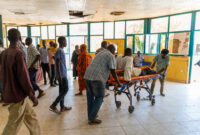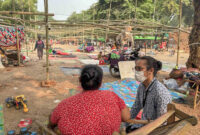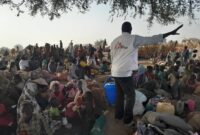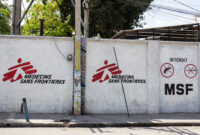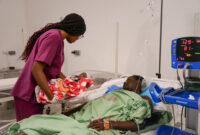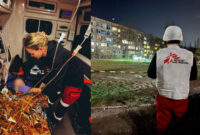The Sahel Spotlight on Niger: Responding to a series of shocks in a fast-warming region
In a new brief for the Lancet Countdown: Tracking Progress on Health and Climate Change 2020, Doctors Without Borders/Médecins Sans Frontières (MSF) medical humanitarian teams around the world and across multiple disciplines share their experiences with how climate change has likely exacerbated health and humanitarian crises. Through country snapshots and case studies, authors share their first-hand perspectives on how climate-related disasters have potentially contributed to increased transmissions of infectious diseases, water scarcity and food insecurity, forced displacement, and mental health impacts in some settings.
The following is just one country snapshot from the MSF brief, which highlights our response and adaptation to increased levels of flooding in Niger in 2020.
Altered precipitation patterns increase the risk of localized flood events, resulting in direct injury, the spread of infectious diseases, and impacts on mental health. Furthermore, both flood and drought can potentially lead to forced migration.
- The rainy season in Niger and the surrounding region regularly results in flooding, but the exceptionally heavy rainfall in 2020 and drought in this land-locked country has been magnified by the climate crisis.
- Sahel temperatures increase one and a half times faster than the global average which has dramatic consequences for livelihoods and contributes to land and resource pressures, conflict, displacement and nutritional crises.
In August 2020, Doctors Without Borders/Médecins Sans Frontières (MSF) responded to the humanitarian needs of people in Niamey, the capital of Niger, after the Niger riverbanks broke, plunging part of the capital under water and driving tens of thousands of people from their homes. The flooding killed at least 71 people and submerged rice fields leading to 350,000 people adversely impacted-many experienced food insecurity and related health issues.

MSF’s response aims to mitigate the increased risks of disease outbreaks related to flooding, such as acute diarrhea, malaria and cholera and to provide emergency relief. MSF set up water tanks to provide safe drinking water, in addition to providing medical care and basic supplies to affected families. It also worked to strengthen distribution of mosquito nets. Consequently, fooding coincided with seasonal malaria peak period: 50 percent of 3,500 outpatient consultations were for malaria amongst flood victims in September 2020.
The additional layer of COVID-19
When the COVID-19 pandemic spread to Niger in March, MSF began to respond in the country’s large cities of Niamey and Zinder, conducting mass awareness campaigns, transporting samples from suspected cases to labs and providing logistical support to regional health structures to reinforce hygiene measures and train medical staff in infection prevention and control.

MSF is concerned that with series of shocks from floods and the pandemic, human pressures on and competition for land – given the large numbers of displaced people, food insecurity and vulnerability – will contribute to increased socio-economic, political and conflict risk in a region already devastated by drought and explosive conflict.
“We are facing an exceptional situation, which does not only concern Niger, since the Niger River originates in Guinea and ends in Nigeria via Mali, Niger – all the regions of these countries will be affected. I have just returned from Niamey and all the villages and towns around the river are flooded, the populations have had to leave these regions in large numbers, they no longer have a home and they no longer have anything to eat because their reserves are gone, and the rice fields are flooded.” Dr. Fatouma Mabaye, September, 2020

